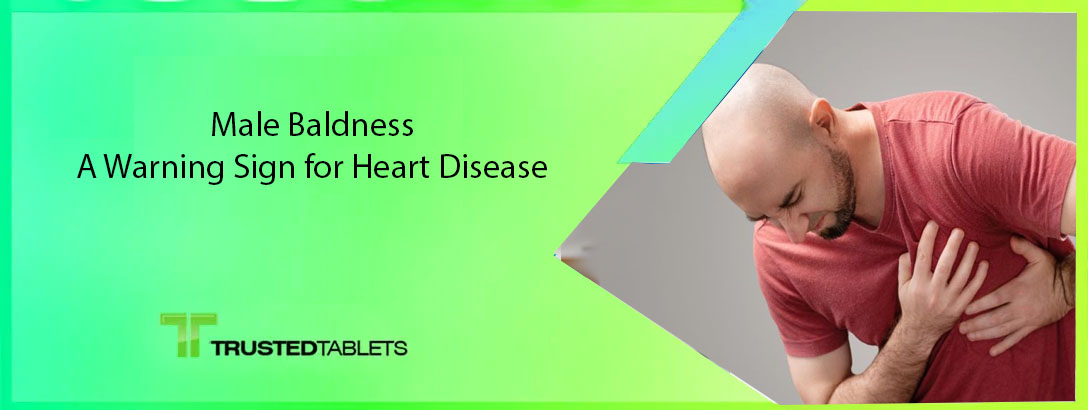For most guys, losing hair is just another frustrating part of getting older. It’s something we associate with self-image, confidence, and sometimes a bit of teasing from friends. But what if I told you that baldness—specifically androgenetic alopecia—might be more than just a cosmetic nuisance? Research suggests that it could actually be a warning sign for something far more serious: heart disease.
The Hidden Link Between Baldness and Heart Disease
Hair loss, especially when it starts early and affects the crown or front of the head, has been linked to an increased risk of cardiovascular issues. A study published in BMJ Open found that men with severe androgenetic alopecia had a significantly higher chance of developing coronary heart disease than those with a full head of hair. Surprising, right? Turns out, your scalp might be sending you an important health alert.
The Role of Hormones: Testosterone and DHT
So, what’s the deal? Why does losing hair mean trouble for your heart? It all boils down to hormones—specifically, androgens like testosterone and its byproduct, dihydrotestosterone (DHT). These hormones shrink hair follicles over time, leading to thinning hair and eventual baldness. But that’s not all they do. DHT also plays a role in atherosclerosis (hardening of the arteries) by impacting lipid metabolism, triggering oxidative stress, and fueling inflammation inside blood vessels. In other words, the same hormones responsible for your receding hairline might also be clogging your arteries.
Inflammation: A Common Denominator
Inflammation is another key player in both baldness and heart disease. Studies show that men experiencing early hair loss often have higher levels of inflammatory markers like C-reactive protein (CRP) and interleukin-6 (IL-6). These troublemakers contribute to the buildup of plaque in arteries, increasing the risk of heart attacks and strokes. Think of it like this: if your body is constantly inflamed, it’s like having a slow-burning fire inside your blood vessels—sooner or later, something’s going to give.
Insulin Resistance and Metabolic Syndrome
Here’s another interesting connection: insulin resistance. Research indicates that men with early-onset baldness are more likely to develop metabolic syndrome, which includes high blood pressure, elevated blood sugar, abdominal obesity, and poor cholesterol levels. This dangerous combination drastically raises the risk of heart disease, stroke, and type 2 diabetes. Essentially, if your metabolism is out of whack, your heart and hair might both suffer the consequences.
Genetics: The Unavoidable Factor
Of course, genetics also play a huge role. Some men are simply predisposed to both baldness and cardiovascular disease due to inherited traits. Certain genetic variations in androgen receptors not only determine how much hair you keep but also influence cholesterol regulation, blood pressure, and inflammation levels. It’s like getting a two-for-one deal—except not the kind you’d want.
Lifestyle Choices: How Your Daily Habits Play a Role
While genetics might set the stage, lifestyle choices can either speed up or slow down the process. Smoking, poor diet, lack of exercise, and chronic stress all contribute to both hair loss and cardiovascular disease. In fact, studies show that men who smoke and experience early baldness face an even greater risk of heart-related complications. So, if you’re lighting up a cigarette while stressing over your hairline, you might want to rethink that habit.
Prevention and Early Detection: What You Can Do
Given the growing evidence linking baldness to heart disease, it’s crucial for men—especially those experiencing early hair loss—to stay proactive about their cardiovascular health. Regular checkups that monitor blood pressure, cholesterol, and blood sugar levels can help catch potential problems before they escalate. And let’s not forget the basics: a heart-healthy diet rich in antioxidants and good fats, regular exercise, stress management, and avoiding harmful habits like smoking can go a long way in keeping both your heart and scalp in better shape.
Can Hair Loss Treatments Help Your Heart?
Interestingly, some medications used for treating hair loss, like finasteride and minoxidil, might have unexpected benefits for heart health. Finasteride, for instance, blocks DHT, which could theoretically reduce its negative effects on blood vessels. However, the long-term impact of these treatments on heart health is still under study. So, while popping a pill might help with your hair, don’t count on it as a magic fix for your heart.
Final Thoughts: Listen to What Your Hair is Telling You
At the end of the day, hair loss isn’t just about looks—it could be an early red flag for underlying health issues, including cardiovascular disease. If you’ve noticed your hair thinning earlier than expected, don’t just brush it off as a genetic curse. Consider it a nudge to take better care of your heart. After all, wouldn’t you rather trade a full head of hair for a longer, healthier life?
Take charge now—because your health (and maybe even your hair) depends on it.


